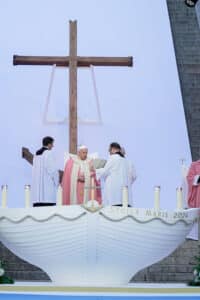Pope Francis's visit to Corsica marks a significant moment in the Catholic Church's outreach, emphasizing themes of peace and unity. The Pope, known for his humble demeanor and focus on social justice, has consistently sought to bridge divides across cultures and communities. His presence in Corsica is not just a religious event but also a cultural milestone, highlighting the importance of dialogue and understanding in our increasingly interconnected world.
As the first-ever papal visit to the French island, this journey holds special significance. Corsica, with its rich history and vibrant traditions, provides a unique backdrop for Pope Francis's message of inclusivity and reconciliation. Through his words and actions, he aims to inspire both the local population and global audiences to embrace diversity and work towards a more harmonious future. This visit underscores the Pope's commitment to engaging with different regions and fostering spiritual growth beyond traditional boundaries.
Pope Francis's Historic Journey to Corsica
Pope Francis embarked on a historic trip to Corsica, marking the first papal visit to the French island. Known locally as Papa Francescu, the pontiff celebrated Mass at an open-air venue, drawing large crowds eager to witness this unprecedented event. This final trip of the year took place just days before his 88th birthday, showcasing his dedication despite personal milestones. By choosing Corsica over other high-profile engagements like the reopening of Notre Dame Cathedral in Paris, Pope Francis demonstrated his preference for reaching out to less prominent yet culturally significant areas.
The decision to visit Corsica reflects the Pope's broader mission to engage with diverse communities and promote inclusiveness within the Church. During his time there, he delivered two important speeches addressing key issues affecting modern society, including the dangers of division caused by certain forms of religiosity. These messages resonated deeply with attendees, reinforcing his role as a unifying figure striving to bring people together under shared values of compassion and solidarity.
Corsica itself serves as a powerful symbol during this visit, given its storied past intertwined with Napoleon Bonaparte's legacy. As the birthplace of one of history's most influential leaders, it offers a fitting stage for Pope Francis's call for unity amidst differences. His emphasis on preserving traditional piety while adapting to contemporary challenges highlights the delicate balance required in maintaining faith relevance today.
A Celebration of Faith and Heritage
During his visit, Pope Francis celebrated Mass in Corsica's capital, Ajaccio, where thousands gathered to participate in what was described as a blend of Renaissance fair flair and spiritual devotion. This unique atmosphere underscored the deep-rooted connection between the island's cultural heritage and its religious practices. The Pope praised Corsica's strong tradition of popular piety, encouraging Catholics to maintain these customs even as secular influences grow stronger across Europe.
In his homily, Pope Francis addressed the clergy present, urging them to guard against spiritual groups that might exacerbate political divisions rather than heal them. He emphasized the importance of priests serving as witnesses rather than officials, echoing sentiments expressed previously through writings such as Witnesses, Not Officials. Such guidance aims to ensure that religious institutions remain focused on nurturing genuine faith experiences among their followers.
This celebration extended beyond mere ritualistic observance; it represented an opportunity for renewal and reflection within the community. By participating actively in the Mass, attendees were reminded of their collective responsibility to uphold moral principles and contribute positively to societal progress. In doing so, they aligned themselves with Pope Francis's vision of a compassionate world united by mutual respect and understanding.
Encouraging Traditional Piety Amidst Change
Pope Francis used his visit to Corsica as a platform to encourage the preservation of traditional Catholic practices amidst growing secular trends. Speaking directly to the island's predominantly Catholic population, he highlighted the value of maintaining long-standing devotional habits that connect individuals to their faith roots. At the same time, he acknowledged the need for adaptation to changing times, advocating for a balanced approach that respects both historical continuity and current realities.
His remarks resonated particularly well with older generations who cherish familiar rituals but also struck a chord with younger participants seeking meaningful ways to express their spirituality. By framing traditional piety as a source of strength rather than rigidity, Pope Francis offered a hopeful perspective on how ancient customs can coexist harmoniously with modern lifestyles. This inclusive stance helps bridge generational gaps within congregations, fostering greater cohesion and purpose.
Ultimately, Pope Francis's message transcended geographical boundaries, speaking to universal concerns about identity preservation in an ever-evolving world. Through his actions and words in Corsica, he reinforced the idea that authentic faith thrives when grounded in timeless truths yet open to innovative expressions. Such insights provide valuable guidance not only for Catholics but for all those navigating complex cultural landscapes today.

